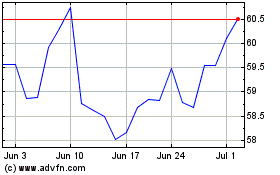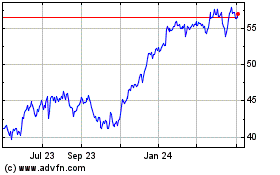By Andrew Ackerman and Lalita Clozel
WASHINGTON -- The chief executives at seven of the largest U.S.
banks faced adversarial questioning from House Democrats on
Wednesday, as lawmakers evaluated changes in the industry since the
financial crisis.
Bank chiefs including JPMorgan Chase & Co.'s James Dimon,
Citigroup Inc.'s Michael Corbat and Goldman Sachs Group Inc.'s
David Solomon told skeptical lawmakers that their firms were safer
and more tightly overseen than they were a decade ago.
House Financial Services Committee Chairwoman Maxine Waters (D.,
Calif.) said she was concerned the banks are "simply too big to
manage their own operations." She also criticized a series of legal
settlements between the banks and their regulators, saying the
firms were "chronic" lawbreakers and "too big to care about the
harm they have caused."
"As policy makers we must evaluate what it will take to rein in
chronic lawbreaking by the biggest banks," she added.
Some Republicans criticized Democrats for holding the hearing,
saying there was no clear purpose behind it other than to attack
the nation's biggest lenders.
"This is a hearing in search of a headline," said Rep. Patrick
McHenry (R., N.C.), the ranking GOP member on the panel.
Wednesday's hearing marks the first time since February 2009
that chief executives of the major banks have appeared together at
a congressional panel. The hearing is part of an opening salvo in
House Democrats' plans to examine the industry's activities, though
split control of Congress means it is unlikely to lead to any new
legislation becoming law.
Anticipating tough questions, banks and their industry group,
the Financial Services Forum, spent weeks preparing and developed
detailed policy briefings on everything from executive compensation
to diversity issues.
The banks or their industry group have met with each of the 60
members of the panel, with the exception of freshman Rep.
Alexandria Ocasio-Cortez (D., N.Y.). Industry officials said she
declined to meet with them.
A spokesperson for Ms. Ocasio-Cortez declined to comment.
Big-bank CEOs were lightning rods a decade ago for the anger and
misery fueled by the crisis, when many home prices collapsed and
unemployment jumped amid a deep recession. At Wednesday's hearing,
the bank executives stressed that their industry is healthier and
better capitalized than it was 10 years ago.
"While we will never lose sight of the lessons learned,
postcrisis reforms have addressed key concerns," said Mr.
Dimon.
"Since the crisis, reforms have made banks much safer and
sounder in three important areas: capital, liquidity and resolution
recovery," he added.
Some Democrats sought to point to the CEOs as illustrations of
growing income inequality in the U.S. Rep. Nydia Velazquez (D.,
N.Y.) questioned Mr. Corbat over the ratio between his salary, $24
million in 2018, and the median pay of employees at his firm.
"Believe me, it doesn't look good," she said. "People who live
in a bubble ... don't understand why there is so much anger out
there."
Mr. Corbat said if he were to work under a boss with a much
higher pay grade than his, "I would be hopeful that there's
opportunities to continue to advance within the firm."
The CEOs of the five big Wall Street Banks -- Goldman Sachs,
Citigroup, JPMorgan Chase, Bank of America and Morgan Stanley --
were paid a combined $126 million in 2017, hitting the highest
level since before the crisis. Tim Sloan, who resigned from his
role as head of Wells Fargo after appearing before the same panel
in March, was awarded $18.4 million in compensation for 2018,
including a $2 million incentive award announced by the bank a day
after the contentious hearing.
Some of Ms. Waters's questioning of the bank executives fell
flat, including an initial set of questions about whether the banks
had uncovered accounts tied to illicit Russian businesses. Each of
the chief executives said their firms had no such connections or
couldn't comment on internal investigations.
Democrats and Republicans both pushed the CEOs to detail their
relationships with gun companies. In one exchange, Carolyn Maloney
(D., N.Y.) asked Mr. Dimon to adopt a policy on "responsible
business" with the gun industry, and the JP Morgan chief said he
would consider it.
Rep. Bill Posey (R., Fla.) asked several banks to describe their
relationships with companies that manufacture guns for the
military, saying "I have noticed a recent trend to withhold or
withdraw banking services from completely legal businesses."
Mr. Solomon said Goldman Sachs doesn't do business with
companies that manufacture assault weapons, bump stocks or
high-capacity magazines. Mr. Gorman said Morgan Stanley has
"restricted our activities" with retailers of automatic and
semiautomatic weapons.
Banks have been criticized on both sides for their relationship
to gun companies, with some Democrats calling for financial
institutions to sever their ties in the wake of the Parkland, Fla.,
high school shooting last year and some Republicans criticizing
banks who did.
Citi announced it would no longer partner with retailers that
sell guns to customers under the age of 21 or who haven't passed a
background check, and Bank of America said it would stop lending to
manufacturers of military-inspired rifles.
In all, seven bank CEOs appeared before Ms. Waters's panel on
Wednesday. In addition to the heads of JPMorgan, Citigroup and
Goldman, they include Morgan Stanley's James Gorman, Bank of
America Corp.'s Brian Moynihan, State Street Corp.'s Ronald
O'Hanley and Bank of New York Mellon Corp.'s Charles Scharf.
(END) Dow Jones Newswires
April 10, 2019 12:38 ET (16:38 GMT)
Copyright (c) 2019 Dow Jones & Company, Inc.
Bank of New York Mellon (NYSE:BK)
Historical Stock Chart
From Mar 2024 to Apr 2024

Bank of New York Mellon (NYSE:BK)
Historical Stock Chart
From Apr 2023 to Apr 2024
